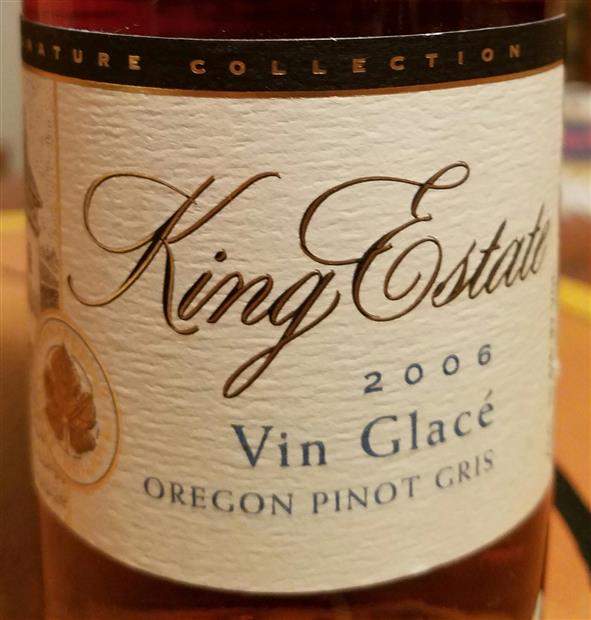2004 King Estate Pinot Gris Vin Glacé |
| Vintage | 2004 |  | |
| Type | White - Sweet/Dessert | ||
| Producer | King Estate (web) | ||
| Variety | Pinot Gris | ||
| Designation | Vin Glacé | ||
| Vineyard | n/a | ||
| Country | USA | ||
| Region | Oregon | ||
| SubRegion | Willamette Valley | ||
| Appellation | Willamette Valley |
| Drinking Windows and Values |
| Drinking window: Drink between 2006 and 2010 (based on 5 user opinions) |
| Community Tasting History |
| No community notes |
| CellarTracker Wiki Articles |
King EstateProducer websitehttp://img48.imageshack.us/img48/4713/kingestatejpgrv6.jpg King Estate winery in Oregon in this 2003 photograph. Pinot GrisFrom Pinot Gris Wikipedia entry:Wines made from the Pinot gris vary greatly and are dependent on the region and wine making style they are from. Alsatian Pinot gris are medium to full bodied wines with a rich, somewhat floral bouquet. They tend to be spicy in comparisons with other Pinot gris. While most Pinot gris are meant to be consumed early, Alsatian Pinot gris can age well. German Pinot gris are more full-bodied with a balance of acidity and slight sweetness. In Oregon the wines are medium bodied with a yellow to copper-pink color and aromas of pear, apple, and/or melon. In California, the Pinot gris are more light bodied with a crisp, refreshing taste with some pepper and arugula notes. The Pinot grigio style of Italy is a light-bodied, often lean wine that is light in color with sometimes spritzy flavors that can be crisp and acidic. Although this wine can be very sweet, it will begin to lose its acidity when it is nearly ripe. Pinot gris is considered an "early to market wine" that can be bottled and out on the market within 4–12 weeks after fermentation. Varietal character (Appellation America) Conseillé pour l'apéritif et avec les mets suivants : Foie Gras terrine Foie Gras poęlé Tarte tatin USAAmerican wine has been produced since the 1500s, with the first widespread production beginning in New Mexico in 1628. Today, wine production is undertaken in all fifty states, with California producing 84% of all U.S. wine. The continent of North America is home to several native species of grape, including Vitis labrusca, Vitis riparia, Vitis rotundifolia, and Vitis vulpina, but the wine-making industry is based almost entirely on the cultivation of the European Vitis vinifera, which was introduced by European settlers. With more than 1,100,000 acres (4,500 km2) under vine, the United States is the fourth-largest wine producing country in the world, after Italy, Spain, and France.OregonOregon Wine, Oregon Wineries (Oregon Wine Board)Willamette ValleyWillamette Valley Wineries Association | Willamette Valley (Oregon Wine Board)On weinlagen-info including some single vineyards Willamette Valley Vintage Reviews Willamette ValleyWillamette Valley Wineries Association | Willamette Valley AVA Wikipedia article#2012 vintage: "Broadly speaking, the Willamette Valley's 2012 pinots are fleshy and fruit-dominated, with round tannins and forward personalities. The fruit tends to the darker side of the pinot spectrum--think cherry and blackberry rather than strawberry and raspberry, much less cranberry and redcurrant--and this gives the wines massive crowd appeal. The best wines also have the depth to age, so don't be fooled by their accessible nature in the early going." - Josh Raynolds #2013 vintage: "The key to a successful foray into the ‘13s is first to understand that in most instances the wines lean to the red fruit side of Pinot Noir; they tend to be tangy and tightly wound but often lack concentration. While some wines may put on weight and gain sweetness with bottle age, that’s a gamble I’ll personally leave to others. The 2013s also tend to lack the tannic structure for more than mid-term aging although they will likely endure on their acidity, which I suspect will usually outlast the fruit in this vintage" - Josh Raynolds #2014 vintage: "The 2014 vintage in Oregon may be remembered as the vintage of a lifetime [for growers] . . . these wines as they will be similar to the 2009 vintage . . . lovely, ripe, rich, deeply concentrated and aromatic" - winebusiness.com "The conditions made it relatively easy to make good wines, with no worries about achieving ripeness, and the lack of frost risk allowed us to keep grapes on the vine as long as we wished." - Casey McClellan |